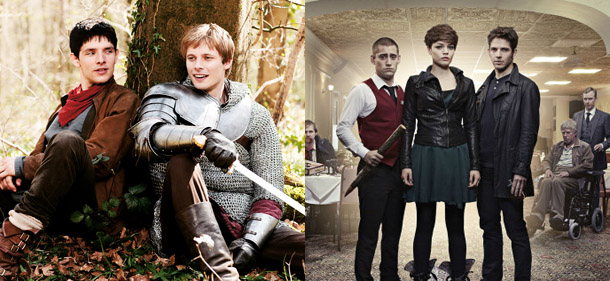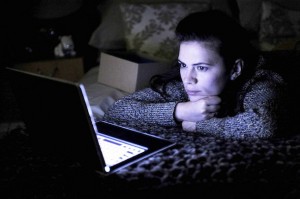BLOG Merlin And Being Human Cancellation Coincidences
Alasdair Stuart loves humans, always seeing patterns in things that aren’t there. And to prove it he compares the cancellations of Being Human and Merlin…

My favourite word, in the whole English language, is…
Pareidolia.
It’s defined as “… a psychological phenomenon involving a vague and random stimulus being perceived as significant,” which sounds dry as hell, right? Except pareidolia is the reason why you see shapes in clouds, why you hear voices on records played backwards, why you see a face on Mars, even though there isn’t one.
Maybe.
I mention this because, well, this week my pareidoila got pinged good and hard as we’ve just had recent history repeat itself. At the end of November last year, with five episodes left on the schedule, the BBC announced that season five would be Merlin ’s last. The actual decision to end the show (officially) was the producers and not the BBC, so fair enough.
Except that, whilst the announcement was sad if unsurprising, the manner of the announcement was very odd, and from what I can tell, that was all the BBC’s doing. Why wasn’t it trailed as the final series before the series began? After all, a final act tends to bring back viewers who’ve wandered off in previous seasons. And the way the announcement was phrased seemed almost off-hand; there was a sense to the language used that we should already have known this was coming (and certainly there had been rumours) and this was simply confirmation. Which, of course, it wasn’t: the vast majority of the show’s fans were upset not only by the announcement but the casual way in which they were told.
Which is sad, especially as Merlin did a very good job, along with Doctor Who , of revitalising the Saturday night drama slot. But, like I say, these things happen.
Get sneak previews, exclusive competitions and details of special events each month!
But they don’t normally happen in pairs.
“Consequently we’ve created what I hope you’ll agree is an epic, thrilling and shocking finale that’ll keep the fans guessing and speculating for years to come.”
Oh good, ambiguity. Geeks love ambiguity.
That being said, the show is Whithouse’s baby and he worked wonders last season under horrible pressure so I’m sure the send-off will be great. But, that’s not really the point. The point is pareidolia. Whilst these two shows have clearly been cancelled for different reasons – and by different people – pareidolia makes it look like the BBC isn’t a healthy environment for genre shows these days.
And you know where that leads, because your brain has probably been going there since you read the news or started reading this:

Doctor Who .
Let’s take a look at what we know before we open that can of worms. Merlin was pulled by the producers because they felt it was at the end of its run. You have to respect the desire to go out on a high, and this doesn’t seem to have any sinister portends for Who ’s future. On the other hand, Being Human ’s cancellation definitely came from the outside and seems to have been motivated by the desire to see fresh blood on the channel and higher ratings. Which means, of course, money’s a factor. Looked at that way, again, Doctor Who is safe, as one of the most commercially successful things the BBC has. Look at the never-ending swathes of merchandise, the cultural crossover, the huge news response to pretty much everything involved with it. Doctor Who ’s safe, it’s not going anywhere.
But if money is a factor at the BBC right now, then that may explain why the 50th Anniversary specials look so thin on the ground. Moffat’s much vaunted. “The show will take over television” line is looking like hyperbole of the worst sort now, with, so far, just An Adventure In Space And Time , the 50th anniversary special and the second half of last year’s season on deck for this year’s ration of original Who -related drama. There are persistent rumours, of course, of a Christmas and New Year’s special, of Matt Smith regenerating and that mythical, increasingly unlikely-looking 11 Doctor Gallifrey-a-palooza that keeps being reported. I’d love that to be true and I’d love to be surprised, but right now we’re looking at a pretty thin slate. Or, to put it another way, the 50th Anniversary bash is still on, but this may well be why it’s being held in the village hall and not the swanky place out of town we all had our eye on. If this is true, it’s a real shame and, like I say, I’d love to be surprieds by another raft of episodes in the second half of the year.
But, in amongst all this, there is a bright side. Well actually there are two. The first is that pareidolia is a big lying liar who LIES. There’s every possibility that the BBC is still a very welcoming theatre for genre TV, and there’s some pretty major evidence of that too. Plus, let’s not forget that chances are Fortress Who is completely safe, no accountants are knocking at the door and this is just the Anniversary season they always had planned.

The real bright side though is that genre drama is still doing well and people are still trying new things. Channel 4 is most of the way through the hugely mannered but interesting Utopia ; Misfits has survived the roughest season of its run to fight another year' Black Mirror ’s back and even ITV is back in the game with supernatural drama Lightfields . Also, for all the blood on the floor right now, presumably with Hal itching to get a mop before he starts licking it, the BBC is still developing new genre drama, most notably with The Watch , adapted from the Discworld books and with Rhianna Pratchett in the driving seat. New, fun things are on the way. They just aren’t here yet, which is why things look worse than they actually are. Pareidolia, once again.
The one thing that can’t be written off as pareidolia though is the current PR policy the BBC seem to have. This, “Oh by the way”, approach feels patronising. No, actually let’s call it how it is, it feels RUDE. There’s a sense of these shows being devalued, of their audiences being overlooked and that’s something that the BBC has far too long, and far too ignominious, a history of doing. You win, and hold an audience through two things; producing good drama that enough people want to see and being as honest as you can be with the audience you have. That’s not pareidolia, that’s basic courtesy and right now, the BBC seem to be sorely lacking in it.
Alasdair Stuart


